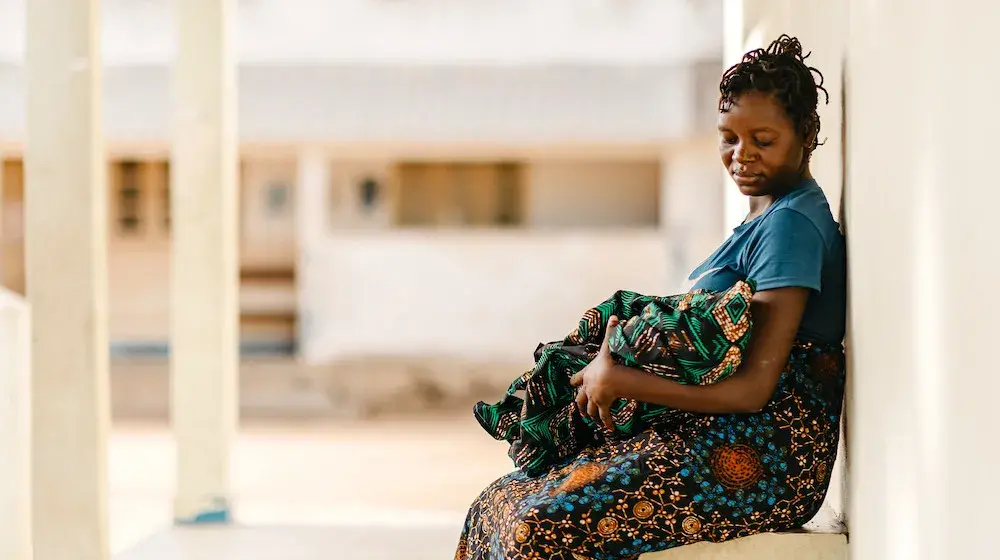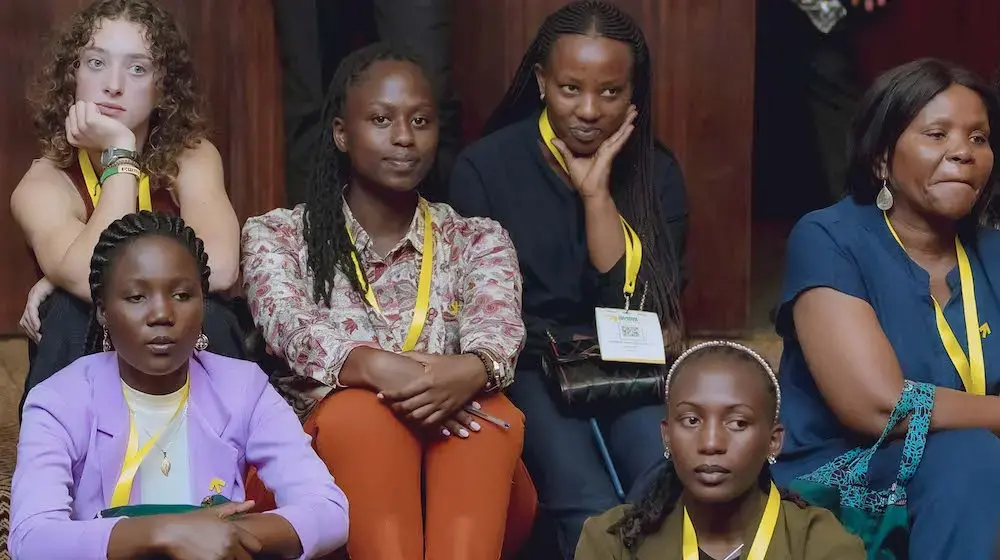UNFPA Africa Regional Director Bunmi Makinwa urged African Members of Parliament to take bold action with respect to maternal and child health and the needs of young people. He made this call at the 2012 Annual African Women Parliamentarians’ Conference in Johannesburg on 4 October, where he also held a meeting with the Pan-African Parliament President, H.E. Hon. Bethel Nnaemeka Amadi.
While sub-Saharan Africa celebrated a 41 per cent reduction in maternal mortality over the past two decades, around 165,000 women in Africa die each year due to pregnancy and related causes. Most of these deaths could be prevented, Mr. Makinwa said. In the region, 1 in 39 women aged 15-49 years dies while giving life, compared to a life-time risk in Sweden of 1 in 14,100 women.
If every baby was delivered by a competent and supported midwife, maternal deaths would drop by 75 per cent – yet supervised delivery is below 50 per cent in Africa. “The failing and gaps for inadequate action is therefore not in the knowledge of proven interventions,” he said. “The gap is in the politics, the policies, the purse and the policing needed to bring the proven interventions to speed, at scale and in scope. This is exactly where parliament has the biggest role.”
Call to action
Mr. Makinwa called on parliaments to take bold action with respect to maternal and child health and the needs of young people:
- Make laws suitable for maternal and child health, and women’s empowerment overall, such as prevention of early marriage, laws on female genital mutilation (FGM), laws on access to free health care, and so on, as you help break the walls of inequities.
- Provide resources to increase access to quality health services and for investment in education, especially of the girl child, and for creation of youth employment.
- Monitor and ask for accountability from the health sector on how resources are being used and the results being seen.
- Make sure that voices of women and children remain key in your constituency representational roles in parliaments.
- Mobilize your population so that maternal and newborn deaths become unacceptable.
“We are, individually and collectively, responsible as we work together to make every pregnancy wanted and every birth safe. And, indeed, we must protect our youth by ensuring access to sexual and reproductive health information and services, education, skills development and creation of productive and employment opportunities,” he said.
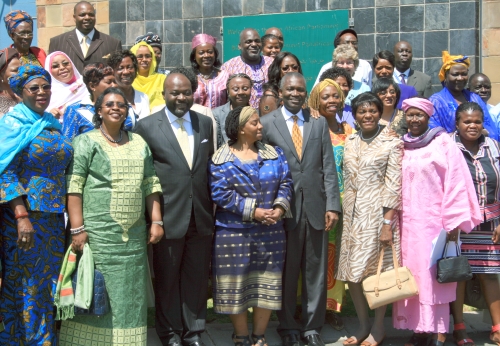
The theme of the two-day women’s caucus was the role of parliamentarians in promoting maternal, newborn and child health in Africa. The guest of honour was Joyce Banda, President of the Republic of Malawi. The event was attended by the President of the Pan-African Parliament, Bethel Nnaemeka Amadi, the Fourth Vice President, Juliana Kantengwa, the First Vice-President of the PAP Women’s Caucus, Abdoulaye Adjaratou, a representative of the Inter-Parliamentary Union, Margaret Mensah Williams, the Speaker of Parliament for the East African Legislative Assembly, Margaret Zziwa, and South African Deputy Director-General of Women’s Empowerment and Gender Equality, Modjadji Seabi. Also present were members of PAP, members of national parliaments, representatives of civil society organizations and the media.
In August, UNFPA partnered with the Inter-Parliamentary Union to design an orientation manual on maternal, newborn and child health for parliamentarians. This will help parliamentarians, who come from diverse backgrounds and have many competing priorities, to deal with maternal, newborn and child health issues within their functions. When the manual is ready, UNFPA’s Country Offices will work with national parliaments to orient them on how to use it. “We hope to see even greater actions on your part after such an orientation,” Mr. Makinwa told the parliamentarians.
UNFPA to hold parliamentary consultations on ICPD beyond 2014
He announced that UNFPA is to hold a series of sub-regional parliamentary consultations on ICPD beyond 2014, as well as on defining other development agendas beyond the 2015 MDG targets. This is in recognition that parliaments work best when they learn from other parliaments and feel mutually supported in their work. “We hope to get your inputs as parliamentarians into these processes,” he said.
UNFPA is also working on establishing the Africa Parliamentary Forum on Population and Development. “We hope this will be the unified voice of African parliaments in international fora, as we see in common voices from other continental parliamentary fora such as the European Parliamentary Forum.”
Mr. Makinwa paid tribute to the Malawian President for her work in her various capacities to date, and for launching the Campaign for Accelerated Reduction of Maternal Mortality in Africa (CARMMA) in Malawi in August, of which she has remained a champion. “UNFPA looks forward to keep working with you in this capacity with your colleagues – Presidents and Heads of State and Government in Africa.”
Regional Director meets with Pan-African Parliament President
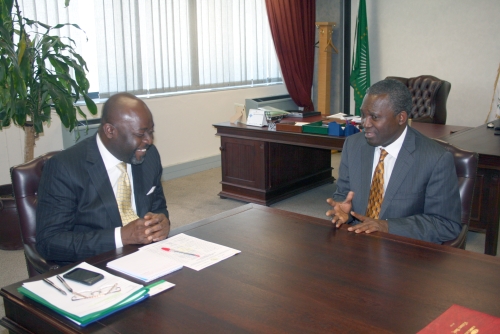
In a meeting with the Pan-African Parliament President, H.E. Hon. Bethel Nnaemeka Amadi, in his offices at the Pan-African Parliament (PAP) in Midrand, Johannesburg, Mr. Amadi said each parliamentarian who attended the day’s session would leave with a finalized report , and these would be fed back to their respective national parliaments. Therefore the issues raised by Mr. Makinwa would be up for deliberation and discussion at the national level, he said.
The PAP is a platform to reach the African continent through the members of parliament to enhance advocacy at the national level. Opportunities such as this one need to be seized to do more for women’s health and the youth, and to bridge the gaps that exist, Mr. Amadi said, and he looked forward to closer cooperation with UNFPA.
Mr. Makinwa informed the President that he would be organizing a meeting of African parliamentarians around the agendas of population and development, and maternal health, to which the President would be invited to speak. One of the key objectives would be to identify regional focal points to take forward the agenda, he said. They would take back to their regions a set of defined resolutions on the issues, to feed into regional and national parliaments.
Briefing the media on child marriage and progress towards the MDGs
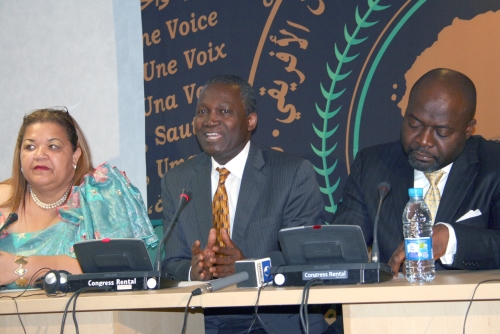
At a press briefing given by Mr. Makinwa, Mr. Amadi, Modjadji Seabi and Margaret Mensah Williams, Mr. Makinwa said in response to questions that when it comes to child marriage in Africa, communities need to be engaged with to tackle the role that culture plays in this area, in order to augment the policies that are put in place.
Regarding Africa’s slow progress towards Millennium Development Goals 4 and 5, he said that the maternal death rate average of 550 deaths per 100,000 live births compared poorly against the developed world’s average of 80 per 100,000 live births. While African countries have agreed to commit 10 per cent of their annual budgets to health and this will go some way towards alleviating the situation, much more needs to be done, he said. Moreover, UNFPA is working together with other organizations to monitor progress towards these two MDGs.
Reproductive and Sexual Health Adolescent Scorecard including Child Marriage and Education of Girl Child Indicators
2012 Annual African Women Parliamentarians' Conference Draft Programme
Parliamentary Launch of Multisectoral African Campaign Against Child ‘Marriage’ & Its Impact on Health & Development of Young Girls and Children Draft Agenda


